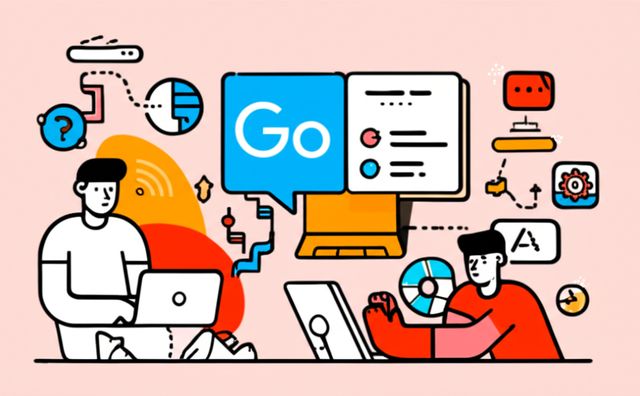Go (programming language)

We're still working on our article for Go (programming language). Please check back soon for more information.
Find a path to becoming a Go (programming language). Learn more at:
OpenCourser.com/topic/qi5tnj/go
Reading list
We've selected 16 books
that we think will supplement your
learning. Use these to
develop background knowledge, enrich your coursework, and gain a
deeper understanding of the topics covered in
Go (programming language).
Given Go's strong support for concurrency, this book is essential for understanding how to build efficient and scalable concurrent applications. It delves into the tools and techniques provided by Go for managing concurrency, such as goroutines and channels. is particularly useful for those looking to deepen their understanding of a core Go feature and is considered a key resource for intermediate to advanced Go developers.
Takes an idiomatic approach to teaching Go, focusing on how experienced Go developers write code. It covers a wide range of topics and goes deep enough for readers to start serious Go development. The second edition includes coverage of generics, making it a relevant resource for contemporary Go programming. It's highly recommended for developers with prior programming experience.
Foundational text for anyone serious about learning Go. Co-authored by a member of the Go team and a legendary computer scientist, it provides a comprehensive introduction to the language's syntax, features, and idioms. While published in 2015, its treatment of core concepts remains highly relevant and is considered a classic. It is an excellent resource for gaining a broad understanding and is often used as a reference.
Is geared towards developers with prior programming experience who want to quickly become proficient in Go. It focuses on practical, real-world examples and covers essential topics like concurrency, testing, and design patterns. It's a valuable resource for solidifying understanding and is considered a must-read by many in the Go community.
Aims to take readers from intermediate to expert level in Go programming. It covers a wide range of topics, including advanced concepts, concurrency, and system programming in Go. The fourth edition ensures coverage of recent Go features, making it relevant for contemporary Go development.
Go is well-suited for building microservices. guides you through the process of designing and implementing microservices in Go. It covers essential concepts and patterns for building resilient and scalable distributed systems. This specialized topic book that adds depth for professionals working with microservices.
Focuses on common errors made by Go developers and how to avoid them. It covers various areas of the language, including concurrency and testing. It's a valuable resource for improving code quality and deepening understanding of potential pitfalls in Go.
For those interested in building web applications with Go, this book provides a practical guide. It covers building scalable and high-performance web applications using Go's standard library and modern design principles. It valuable resource for understanding how to leverage Go's features for web development and is suitable for developers with basic Go knowledge and web development concepts.
Focuses on applying Test-Driven Development (TDD) principles in Go. It covers writing tests at different levels and addresses challenges in testing concurrent code. It's a practical guide for developers who want to adopt a TDD workflow in their Go projects.
Understanding design patterns is crucial for writing maintainable and scalable code. explores how to apply various design patterns in Go, including both Gang of Four patterns and Go-specific concurrency patterns. It helps deepen understanding of how to structure Go applications effectively.
Based on popular training curricula, this book helps readers quickly understand Go syntax, core features, and idioms. It prepares readers to write production-ready Go code from the outset and includes coverage of generics. It's an excellent resource for solidifying foundational knowledge.
Serves as a practical guide with solutions to common problems in Go. It offers a collection of recipes covering various aspects of Go programming. It's a useful reference tool for developers looking for quick and idiomatic ways to perform specific tasks in Go.
Following the popular Head First approach, this book uses a visually rich format to make learning Go engaging and accessible. It covers fundamental concepts and is suitable for beginners. It's a good starting point for those new to programming or new to Go.
Provides a concise introduction to the Go language, covering its basic features and concepts. It's suitable for programmers who want to get up to speed with Go quickly. It serves as a good initial read before diving into more comprehensive resources.
Is recommended for absolute beginners to programming who want to learn Go. It takes a project-based approach, guiding readers through building Go projects from scratch and introducing testing early on. It's a gentle introduction with a focus on practical application.
Beginner-friendly introduction to the Go programming language, assuming some basic programming familiarity. It covers fundamental concepts and syntax in a clear and accessible way. It's a good starting point for those new to Go.
For more information about how these books relate to this course, visit:
OpenCourser.com/topic/qi5tnj/go
